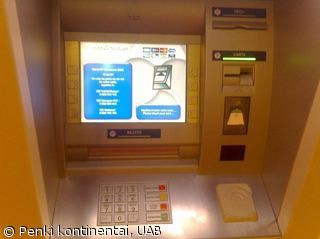Microsoft deserves some blame for the rapidly spreading Web virus
Published:
20 August 2003 y., Wednesday
Microsoft deserves some blame for the rapidly spreading Web virus -- but so do network administrators, ISPs, small businesses, and individual PC users. Compared to the images of sweaty Gothamites trudging across the Brooklyn Bridge in 95-degree heat during the massive power blackout, the MS Blaster worm now seems like a walk in the park.
Still, the latest worm to clog corporate networks and kludge the Net wreaked plenty of havoc in its own right. Internet security companies estimated losses from both downtime and wasted manhours in the hundreds of millions of dollars for U.S. companies. And Blaster-infected machines significantly impacted the Internet. The stream of bogus requests generated by the worm slowed DNS (domain name system) servers that act as the phone directories of the Internet. Compromised computers jammed up networks ranging from BMW in Germany to the Maryland Motor Vehicles Dept.
. Like the Slammer and CodeRed worms before it, Blaster targeted computers running Microsoft Windows 2000 and Windows XP operating systems. The worm carries a small program designed to exploit a chink in Redmond's digital armor and insert a file deep into the operating system in the Windows registry system. The registry is a database where the most basic rules that govern how a Windows machine behaves are stored and categorized.
Once Blaster inhabits the registry, it causes computers to restart without warning and to spew out thousands of connection requests per minute, in search of other machines to infect. The sheer volume of traffic caused enough digital noise to bog down networks.
Šaltinis:
businessweek.com
Copying, publishing, announcing any information from the News.lt portal without written permission of News.lt editorial office is prohibited.
The most popular articles
Software company announced new structure_ of it_s business.
more »
 Networking sites like Facebook and YouTube are changing politics.
more »
Networking sites like Facebook and YouTube are changing politics.
more »
 Vendor to service almost 4,000 existing ATMs and supply another 450.
more »
Vendor to service almost 4,000 existing ATMs and supply another 450.
more »
 The advent of deposit automation, facilitated in many ways by the implementation of Check 21, is not only improving check-handling processes at the self-service terminal – it also is improving handling within the bank branch itself.
more »
The advent of deposit automation, facilitated in many ways by the implementation of Check 21, is not only improving check-handling processes at the self-service terminal – it also is improving handling within the bank branch itself.
more »
 The Moroccan Post Office, Barid Al-Maghrib, has selected Bull to act as project manager on the automation project for its International Mail Center in Casablanca.
more »
The Moroccan Post Office, Barid Al-Maghrib, has selected Bull to act as project manager on the automation project for its International Mail Center in Casablanca.
more »
 Gemalto has taken home one of the most coveted technology prizes in Austin with its Smart Enterprise Guardian (SEG).
more »
Gemalto has taken home one of the most coveted technology prizes in Austin with its Smart Enterprise Guardian (SEG).
more »
 Banks in Australia are rushing to install gas detectors into their ATMs, as gas-explosive attacks on ATMs in the country continue to climb.
more »
Banks in Australia are rushing to install gas detectors into their ATMs, as gas-explosive attacks on ATMs in the country continue to climb.
more »
 EMC CEO Joe Tucci and Microsoft CEO Steve Ballmer showcase deep technology collaboration at New York CIO Summit.
more »
EMC CEO Joe Tucci and Microsoft CEO Steve Ballmer showcase deep technology collaboration at New York CIO Summit.
more »
 India-based mChek looks to offer its secured SIM-card-based mobile applications through partnership with Gemalto.
more »
India-based mChek looks to offer its secured SIM-card-based mobile applications through partnership with Gemalto.
more »
 Nearly one week after news emerged of the big data breach at Princeton, N.J.-based merchant acquirer Heartland Payment Systems Inc., it remains unclear how much damage actually happened and who did it.
more »
Nearly one week after news emerged of the big data breach at Princeton, N.J.-based merchant acquirer Heartland Payment Systems Inc., it remains unclear how much damage actually happened and who did it.
more »
 Wincor Nixdorf AG has announced the release of an enhanced security product for bank branches called ProTect.
more »
Wincor Nixdorf AG has announced the release of an enhanced security product for bank branches called ProTect.
more »